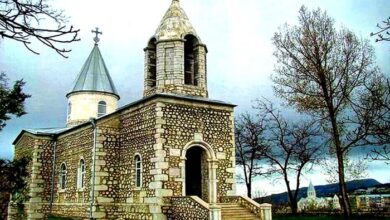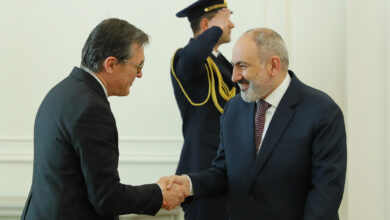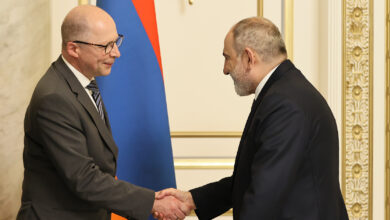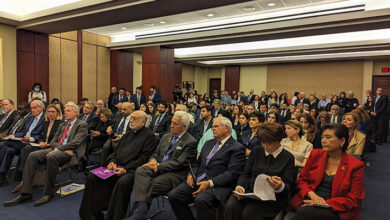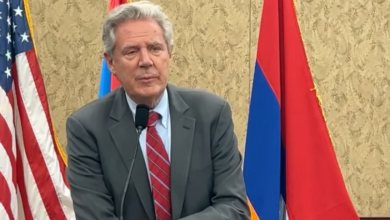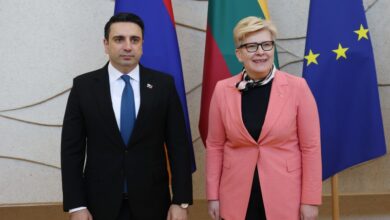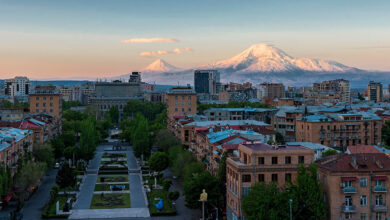Armenian Genocide Centennial became a symbol of collective memory: Foreign Minister
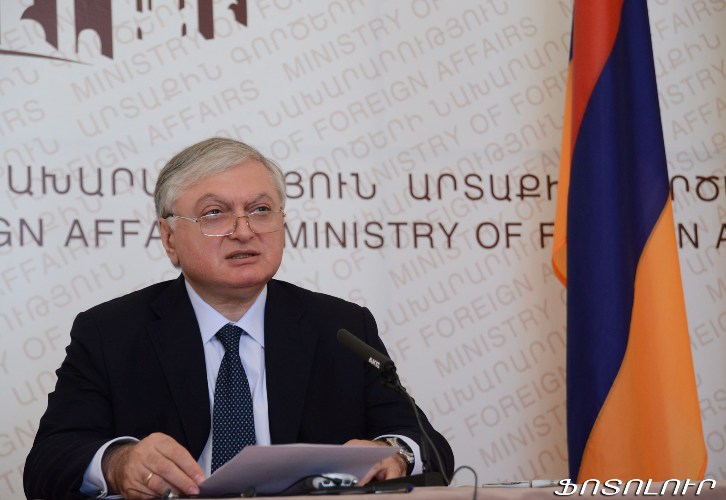
“The Armenian Genocide Centennial became a symbol of collective memory, gratitude and regeneration of the Armenian people,” Armenian Foreign Minister Edward Nalbandian said in an interview with Tert.am.
Question: What steps were taken on the international arena in 2015, the Centennial year of the Armenian Genocide?
Edward Nalbandian: Thousands of events were held throughout the world within the framework of the Armenian Genocide Centennial.
The events organized ahead of the commemoration and during this year, as well as the future events are only the visible part of the work. Each event is a result of complex efforts. Our diplomacy has taken and continues to take relevant steps towards the international recognition of the Armenian Genocide, as well as raising international public awareness about it.
On March 27, in Geneva the UN Human Rights Council adopted by consensus the Genocide Prevention Resolution initiated by Armenia. More than 70 states joined Armenia and co-authored the resolution.
This was not Armenia’s first initiative. We initiated such resolutions also in 2013 and, even before, which is a reflection of Armenia’s consistency in its genocide-prevention efforts.
The resolution considers the attempts to deny or justify the crime of genocide as a serious obstacle for the prevention of genocide.
By the Resolution the Human Rights Council recommended the UN General Assembly to proclaim December 9, the day when the Convention on the Prevention and Punishment of the Crime of Genocide was adopted, as the International Day of Commemoration of the Victims of Genocide. The UN General Assembly confirmed it by adopting the resolution initiated by Armenia.
During the Armenian Genocide Centennial the European Parliament, which represents 28 countries, adopted a special resolution that condemns denialism and calls on Turkey to come to terms with its past, to recognize the Armenian Genocide and thereby to path a way for the reconciliation between the Armenian and the Turkish peoples.
Other numerous European structures adopted resolutions on the Genocide Centennial. Over two hundred MPs, representing forty countries of the Council of Europe’s Parliamentary Assembly, issued a statement. Statements were also made by such institutions as the Euronest Parliamentary Assembly, the European People’s Party, the European Green Party and others.
Question: And what were the developments beyond the European continent?
Edward Nalbandian: Indeed, it was not limited by European institutions only. The Latin American Parliament (Parlatino), which unites 23 legislative bodies of the countries of Latin America and the Caribbean, adopted a resolution recognizing the Armenian Genocide.
In October, the Yerevan Ministerial Conference of the International organization of La Francophonie, which represents 80 countries, adopted the “Genocide Prevention Resolution”, initiated by Armenia. On April 24 Michaëlle Jean, the Secretary-General of the same organization, made a statement, by which she paid a tribute to the memory of the victims of the Armenian Genocide and expressed support to the Armenian people.
Question: You have presented the steps taken by international institutions. What would you outline in regard to the reactions of various leaders, countries?
Edward Nalbandian: Leaders and heads of different countries, governments and parliaments expressed their solidarity with the Armenian people.
Pope Francis I, the spiritual leader of more than a billion Catholics of the world, during the special Mass at St. Peter’s Basilica on April 12, delivered a very important message on the Armenian Genocide Centennial, which gained international publicity.
On April 24, the heads of various states took part in commemorative events of the Armenian Genocide both in Yerevan and in their respective countries, and addressed important messages.
It is noteworthy, that the President of the Federal Republic of Germany, while speaking about the Armenian Genocide, outlined Germany’s share of responsibility in that crime.
And not only the leader of Germany: while condemning the Armenian Genocide, the executive body of Austria also spoke about the responsibility of the Austro-Hungarian Empire.
The executive bodies of Russia, Argentina, Bolivia, Chile, Paraguay, Brazil, Canada, Belgium, Luxembourg, and other countries adopted new resolutions recognizing the Armenian Genocide or reaffirmed already adopted ones.
In different countries of the world provincial, municipal councils issued declarations and resolutions recognizing the Armenian Genocide and condemning the denial, and that process became extraordinarily widespread this year.
Question: Mr. Nalbandian, what was the reaction of the international public opinion on the Centennial?
Edward Nalbandian: In all continents of the world thousands of articles were published and programs were broadcasted, including CNN, BBC, Euronews, Россия 24, Russia Today, France 24, Al Jazeera, Deutsche Welle, Reuters, RAI, AFP, New York Times, Washington Post, Le Monde, Figaro, Independent, Times.
I enumerated only a small portion. Many other prestigious media outlets raised a powerful wave of information and awareness through their reports, articles and interviews. As a result, the steps undertaken by Ankara in order to cast a shadow, hinder the events organized around the world on the occasion of the Armenian Genocide Centennial, had a boomerang effect just for Turkey, thereby ruining its initiatives. It is noteworthy, that hundreds of publications appeared in the Turkish media, and on April 24, “Hurriyet”, the most popular Turkish newspaper, published an extensive interview with the President of the Republic of Armenia.
Within the context of the international public opinion awareness campaign another important step was the publication of a special issue of the “Politique Internationale” journal, one of the most renowned international political science journals published in Paris, composed of 330 pages, in English and French languages, dedicated to the Armenian Genocide Centennial, in which among other articles, the publications of the President of Armenia, France’s incumbent and former Presidents, as well as articles of numerous renowned genocide scholars were included. A number of international prestigious magazines published special editions dedicated to the Armenian Genocide Centennial.
The Ministry of Foreign Affairs had its important contribution both in organizing the Global Forum “Against the Crime of Genocide” in Yerevan on April 22-23, and ensuring the participation of around five hundred high-ranking politicians, parliamentarians, religious leaders, scholars and experts from more than 50 countries, and, overall, in holding of the forum.
Indeed, the abovementioned is only a part of activities carried out for the proper commemoration of the Armenian Genocide Centennial in international arena.
The Centennial became a symbol of collective memory, gratitude and regeneration of the Armenian people. The new international wave of the Genocide recognition and condemnation is a vivid evidence of the determination, that leads us in our mission to prevent genocides and crimes against humanity.


